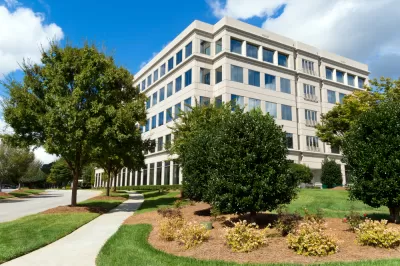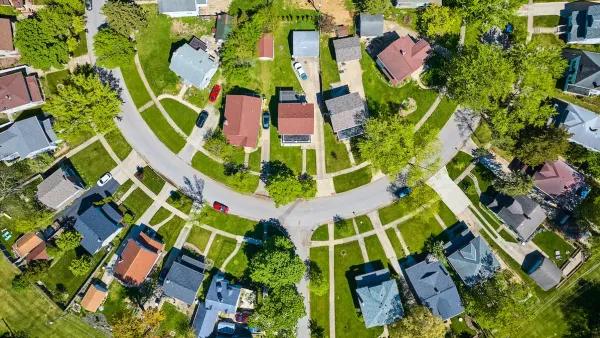When corporations move out of the suburbs, they leaving behind largely unprofitable corporate campuses. Loss of property value and tax revenue follow in the communities they left.

Past decades have seen a trend of major corporations moving their headquarters away from suburbs and small cities and toward larger cities or, in some cases, remote work environments. "Suburban business parks are as outdated and obsolete as fax machines," writes David Bernstein in an article tracking 'big empties,' the "sprawling, once-trendy corporate campuses left behind in the suburbs as companies increasingly relocate to urban centers."
Developing technologies enabled companies like Kmart, McDonald's, Motorola Solutions, and Kraft Heinz to leave their corporate campuses, says Bernstein. It's no longer necessary for all employees to work from a central office. The emptiness of once-booming business centers has consequences for the communities in which they stand. Bernstein traces examples of unoccupied corporate campuses that, without tenants, lose property value and tax revenue leaving local government to pick up the slack.
The vacant campuses now face one of two futures: continued vacancy or demolition. In the case of an AT&T campus that has lost more than $6 million in value over the past five years, plans are being developed to build a 'metroburb,' complete with retail, restaurants, office space, and housing in its place.
FULL STORY: The Big Empty: How Corporate Headquarters Have Abandoned America’s Suburbs

Planetizen Federal Action Tracker
A weekly monitor of how Trump’s orders and actions are impacting planners and planning in America.

Maui's Vacation Rental Debate Turns Ugly
Verbal attacks, misinformation campaigns and fistfights plague a high-stakes debate to convert thousands of vacation rentals into long-term housing.

San Francisco Suspends Traffic Calming Amidst Record Deaths
Citing “a challenging fiscal landscape,” the city will cease the program on the heels of 42 traffic deaths, including 24 pedestrians.

Amtrak Rolls Out New Orleans to Alabama “Mardi Gras” Train
The new service will operate morning and evening departures between Mobile and New Orleans.

The Subversive Car-Free Guide to Trump's Great American Road Trip
Car-free ways to access Chicagoland’s best tourist attractions.

San Antonio and Austin are Fusing Into one Massive Megaregion
The region spanning the two central Texas cities is growing fast, posing challenges for local infrastructure and water supplies.
Urban Design for Planners 1: Software Tools
This six-course series explores essential urban design concepts using open source software and equips planners with the tools they need to participate fully in the urban design process.
Planning for Universal Design
Learn the tools for implementing Universal Design in planning regulations.
Heyer Gruel & Associates PA
JM Goldson LLC
Custer County Colorado
City of Camden Redevelopment Agency
City of Astoria
Transportation Research & Education Center (TREC) at Portland State University
Jefferson Parish Government
Camden Redevelopment Agency
City of Claremont





























